语料库论文fear用法
- 格式:doc
- 大小:32.00 KB
- 文档页数:2
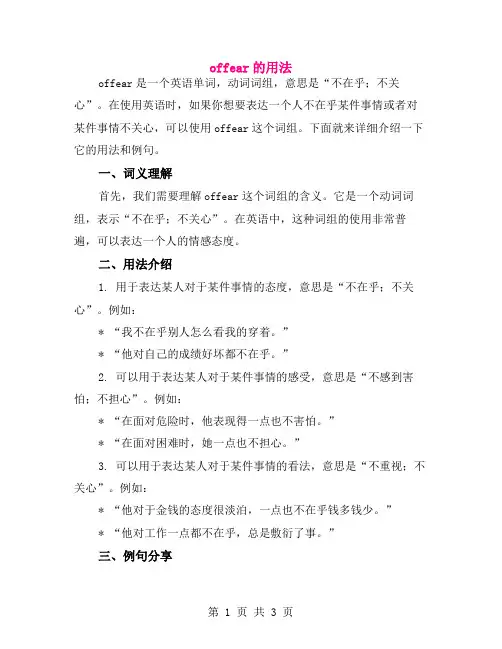
offear的用法offear是一个英语单词,动词词组,意思是“不在乎;不关心”。
在使用英语时,如果你想要表达一个人不在乎某件事情或者对某件事情不关心,可以使用offear这个词组。
下面就来详细介绍一下它的用法和例句。
一、词义理解首先,我们需要理解offear这个词组的含义。
它是一个动词词组,表示“不在乎;不关心”。
在英语中,这种词组的使用非常普遍,可以表达一个人的情感态度。
二、用法介绍1. 用于表达某人对于某件事情的态度,意思是“不在乎;不关心”。
例如:* “我不在乎别人怎么看我的穿着。
”* “他对自己的成绩好坏都不在乎。
”2. 可以用于表达某人对于某件事情的感受,意思是“不感到害怕;不担心”。
例如:* “在面对危险时,他表现得一点也不害怕。
”* “在面对困难时,她一点也不担心。
”3. 可以用于表达某人对于某件事情的看法,意思是“不重视;不关心”。
例如:* “他对于金钱的态度很淡泊,一点也不在乎钱多钱少。
”* “他对工作一点都不在乎,总是敷衍了事。
”三、例句分享1. He doesn't care about what others think of him. He always stays offear.(他不关心别人对他的看法。
他总是毫不在意。
)2. She is offear of success and failure, so she always tries her best in everything she does.(她对成功和失败都毫不在意,所以她总是尽自己最大的努力去做每一件事情。
)3. He is very careless and often makes mistakes, because he doesn't care about them.(他很粗心,经常犯错误,因为他不在乎这些错误。
)四、使用注意事项在使用offear这个词组时,需要注意以下几点:1. 词组中只有一个动词,没有其他助动词或从句。
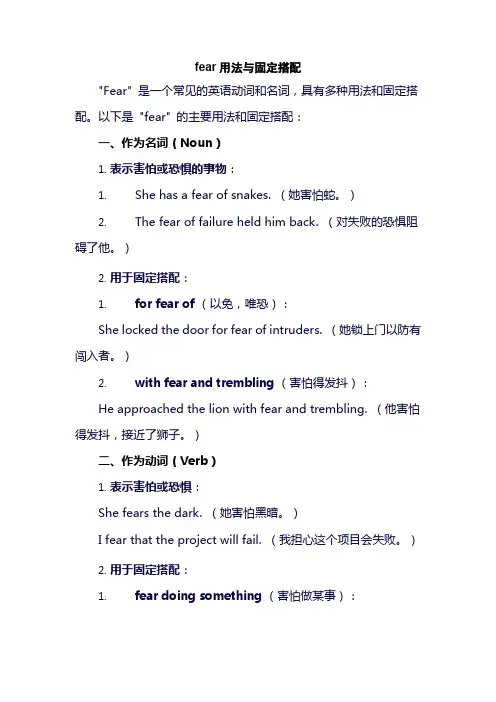
fear用法与固定搭配"Fear" 是一个常见的英语动词和名词,具有多种用法和固定搭配。
以下是"fear" 的主要用法和固定搭配:一、作为名词(Noun)1.表示害怕或恐惧的事物:1.She has a fear of snakes. (她害怕蛇。
)2.The fear of failure held him back. (对失败的恐惧阻碍了他。
)2.用于固定搭配:1.for fear of(以免,唯恐):She locked the door for fear of intruders. (她锁上门以防有闯入者。
)2.with fear and trembling(害怕得发抖):He approached the lion with fear and trembling. (他害怕得发抖,接近了狮子。
)二、作为动词(Verb)1.表示害怕或恐惧:She fears the dark. (她害怕黑暗。
)I fear that the project will fail. (我担心这个项目会失败。
)2.用于固定搭配:1.fear doing something(害怕做某事):She fears going out alone at night. (她害怕晚上一个人出门。
)2.fear for someone/something(为某人/某物感到担心):We all fear for his safety. (我们都为他的安全感到担心。
)3.have no fear of(不害怕,不担心):She has no fear of heights. (她不怕高。
)4.fear not(不必害怕,别担心):Fear not, I will help you. (别担心,我会帮你的。
)三、其他用法1.作为形容词(Adjective):a fear-inducing situation (令人害怕的情况)2.作为及物动词(Transitive Verb):She fears the dog. (她害怕那只狗。
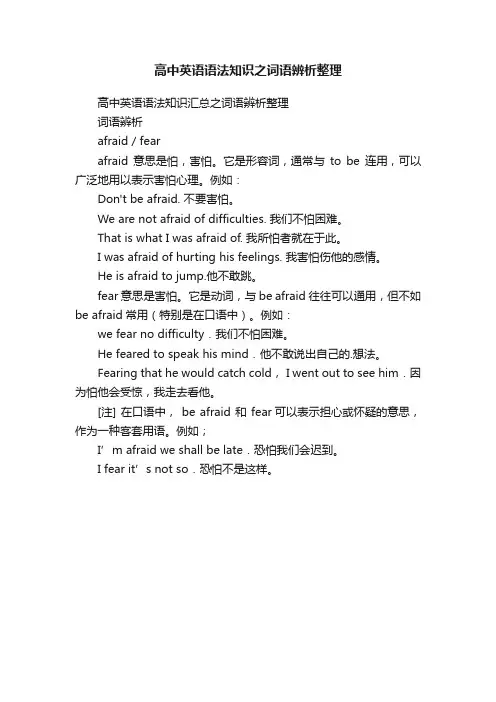
高中英语语法知识之词语辨析整理
高中英语语法知识汇总之词语辨析整理
词语辨析
afraid / fear
afraid 意思是怕,害怕。
它是形容词,通常与to be连用,可以广泛地用以表示害怕心理。
例如:
Don't be afraid. 不要害怕。
We are not afraid of difficulties. 我们不怕困难。
That is what I was afraid of. 我所怕者就在于此。
I was afraid of hurting his feelings. 我害怕伤他的感情。
He is afraid to jump.他不敢跳。
fear 意思是害怕。
它是动词,与be afraid往往可以通用,但不如be afraid常用(特别是在口语中)。
例如:
we fear no difficulty.我们不怕困难。
He feared to speak his mind.他不敢说出自己的.想法。
Fearing that he would catch cold, I went out to see him.因为怕他会受惊,我走去看他。
[注] 在口语中, be afraid 和 fear可以表示担心或怀疑的意思,作为一种客套用语。
例如;
I’m afraid we shall be late.恐怕我们会迟到。
I fear it’s not so.恐怕不是这样。
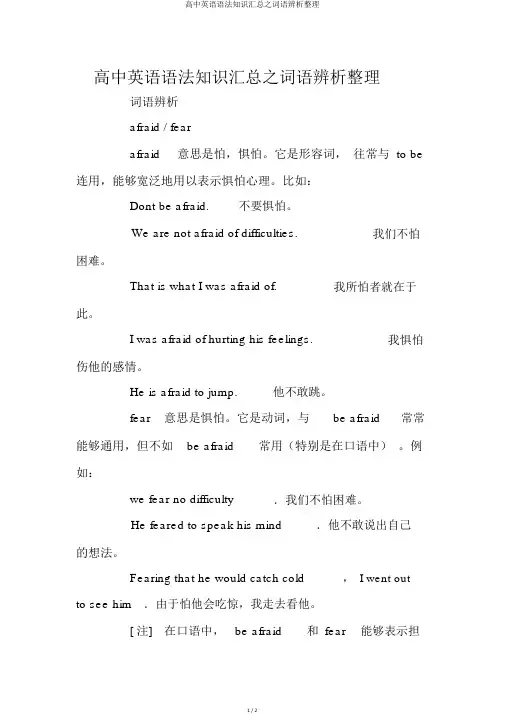
高中英语语法知识汇总之词语辨析整理
词语辨析
afraid / fear
afraid 意思是怕,惧怕。
它是形容词,往常与 to be 连用,能够宽泛地用以表示惧怕心理。
比如:
Dont be afraid.不要惧怕。
We are not afraid of difficulties. 我们不怕困难。
That is what I was afraid of. 我所怕者就在于此。
I was afraid of hurting his feelings. 我惧怕伤他的感情。
He is afraid to jump.他不敢跳。
fear 意思是惧怕。
它是动词,与be afraid常常能够通用,但不如be afraid常用(特别是在口语中)。
例如:
we fear no difficulty .我们不怕困难。
He feared to speak his mind.他不敢说出自己
的想法。
Fearing that he would catch cold,I went out to see him.由于怕他会吃惊,我走去看他。
[ 注]在口语中,be afraid和fear能够表示担
心或思疑的意思,作为一种客气用语。
比如;
I ’m afraid we shall be late.唯恐我们会迟到。
I fear it’ s not so.唯恐不是这样。
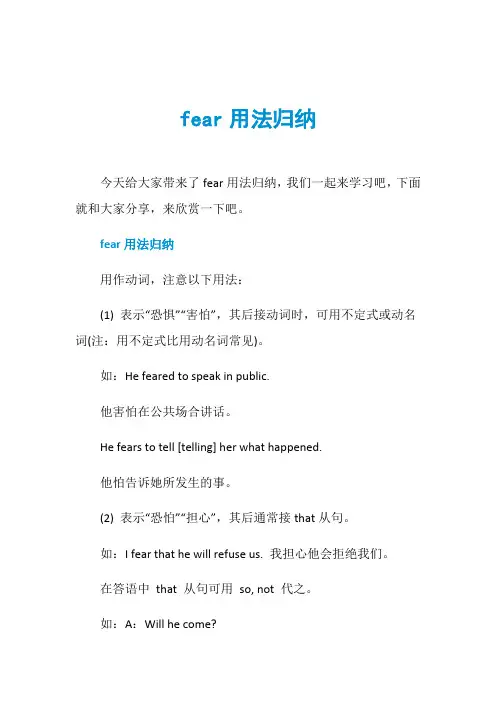
fear用法归纳今天给大家带来了fear用法归纳,我们一起来学习吧,下面就和大家分享,来欣赏一下吧。
fear用法归纳用作动词,注意以下用法:(1) 表示“恐惧”“害怕”,其后接动词时,可用不定式或动名词(注:用不定式比用动名词常见)。
如:He feared to speak in public.他害怕在公共场合讲话。
He fears to tell [telling] her what happened.他怕告诉她所发生的事。
(2) 表示“恐怕”“担心”,其后通常接that从句。
如:I fear that he will refuse us. 我担心他会拒绝我们。
在答语中that 从句可用so, not 代之。
如:A:Will he come?他会来吗?B:I fear so. /I fear not.我想会来吧/我想不会来吧。
【注】后接否定的宾语从句时,通常不转移到主句。
如:I fear it won’t do much good.我担心这不会有多大好处。
(3) 通常不接不定式的复合结构。
如:我担心他会失败。
误:I fear him to fail.正:I fear that he will fail.(4) 比较fearsb与fearforsb:前者意为害怕某人,后者意为为某人担心。
如:He fears his wife.他怕他老婆。
He fears for his wife.他为他老婆担心。
2用作名词,比较forfearof与infearof:前者意为“由于怕……”“以防……”,后者意为“害怕”“担心”。
如:Shut the window for fear of catching a cold.关闭窗户以免感冒。
We’re in fear of more snow.我们担心会再下雪。
The thief passed the day in fear of discovery.这个小偷整天提心掉胆担心会被发现。
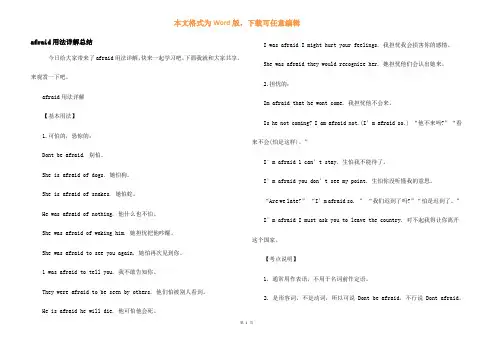
afraid用法详解总结今日给大家带来了afraid用法详解,快来一起学习吧,下面我就和大家共享,来观赏一下吧。
afraid用法详解【基本用法】1.可怕的,恐惊的:Dont be afraid. 别怕。
She is afraid of dogs. 她怕狗。
She is afraid of snakes. 她怕蛇。
He was afraid of nothing. 他什么也不怕。
She was afraid of waking him. 她担忧把他吵醒。
She was afraid to see you again. 她怕再次见到你。
1 was afraid to tell you. 我不敢告知你。
They were afraid to be seen by others. 他们怕被别人看到。
He is afraid he will die. 他可怕他会死。
I was afraid I might hurt your feelings. 我担忧我会损害你的感情。
She was afraid they would recognize her. 她担忧他们会认出她来。
2.担忧的:Im afraid that he wont come. 我担忧他不会来。
Is he not coming? I am afraid not.(I’m afraid so.) “他不来吗?”“看来不会(怕是这样)。
”I’m afraid l can’t stay. 生怕我不能待了。
I’m afraid you don’t see my point. 生怕你没听懂我的意思。
“Are we late?”“I’m afraid so. ”“我们迟到了吗?”“怕是迟到了。
” I’m afraid I must ask you to leave the country. 对不起我得让你离开这个国家。
【考点说明】1. 通常用作表语,不用于名词前作定语。
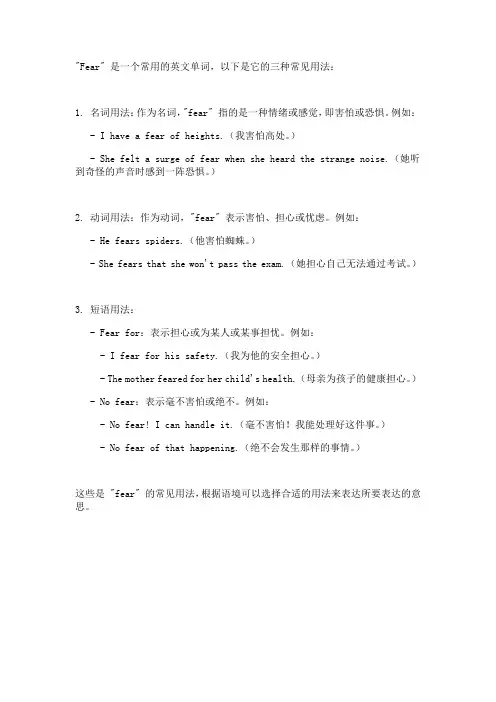
"Fear" 是一个常用的英文单词,以下是它的三种常见用法:
1. 名词用法:作为名词,"fear" 指的是一种情绪或感觉,即害怕或恐惧。
例如: - I have a fear of heights.(我害怕高处。
)
- She felt a surge of fear when she heard the strange noise.(她听到奇怪的声音时感到一阵恐惧。
)
2. 动词用法:作为动词,"fear" 表示害怕、担心或忧虑。
例如:
- He fears spiders.(他害怕蜘蛛。
)
- She fears that she won't pass the exam.(她担心自己无法通过考试。
)
3. 短语用法:
- Fear for:表示担心或为某人或某事担忧。
例如:
- I fear for his safety.(我为他的安全担心。
)
- The mother feared for her child's health.(母亲为孩子的健康担心。
) - No fear:表示毫不害怕或绝不。
例如:
- No fear! I can handle it.(毫不害怕!我能处理好这件事。
)
- No fear of that happening.(绝不会发生那样的事情。
)
这些是 "fear" 的常见用法,根据语境可以选择合适的用法来表达所要表达的意思。
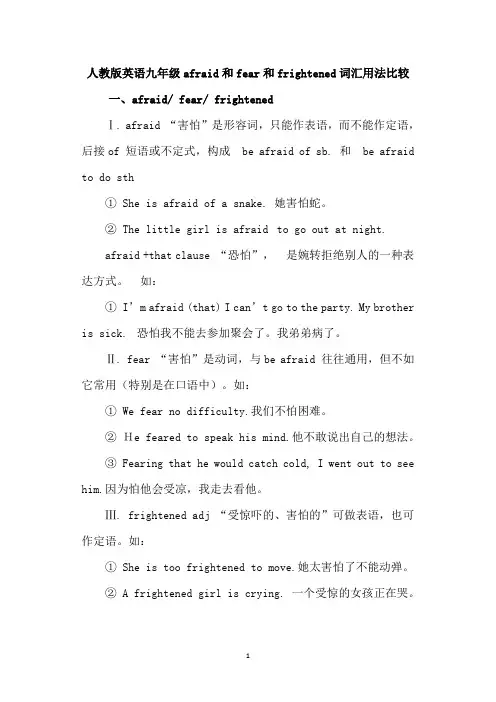
人教版英语九年级afraid和fear和frightened词汇用法比较一、afraid/ fear/ frightenedⅠ. afraid “害怕”是形容词,只能作表语,而不能作定语,后接of 短语或不定式,构成be afraid of sb. 和be afraid to do sth① She is afraid of a snake. 她害怕蛇。
② The little girl is afraid to go out at night.afraid +that clause “恐怕”,是婉转拒绝别人的一种表达方式。
如:① I’m afraid (that) I can’t go to the party. My brother is sick. 恐怕我不能去参加聚会了。
我弟弟病了。
Ⅱ. fear “害怕”是动词,与be afraid 往往通用,但不如它常用(特别是在口语中)。
如:① We fear no difficulty.我们不怕困难。
②He feared to speak his mind.他不敢说出自己的想法。
③ Fearing that he would catch cold, I went out to see him.因为怕他会受凉,我走去看他。
Ⅲ. frightened adj “受惊吓的、害怕的”可做表语,也可作定语。
如:① She is too frightened to move.她太害怕了不能动弹。
② A frightened girl is crying. 一个受惊的女孩正在哭。
二、affair/matter/businessⅠ. affair “事、事情、事务”它的涵义最广,可指已经发生或必须做的任何事情,也可泛指事务(通常用算数,指重大或头绪较多的事务)。
如:① The railway accident was a terrible affair.那次火车事故是件可怕的事。
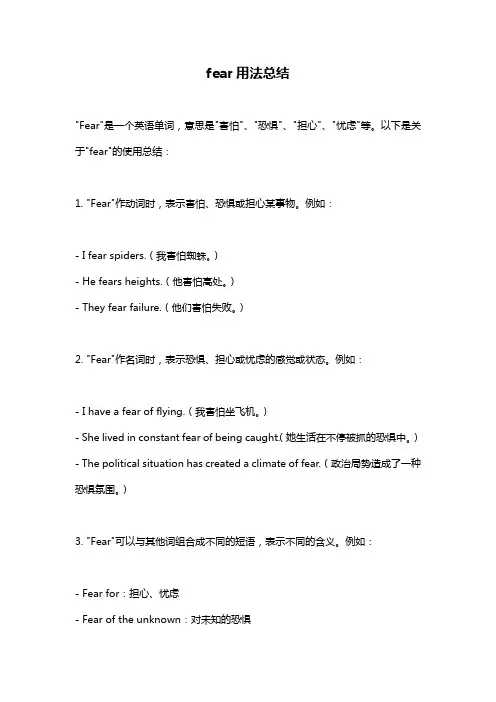
fear用法总结"Fear"是一个英语单词,意思是"害怕"、"恐惧"、"担心"、"忧虑"等。
以下是关于"fear"的使用总结:1. "Fear"作动词时,表示害怕、恐惧或担心某事物。
例如:- I fear spiders.(我害怕蜘蛛。
)- He fears heights.(他害怕高处。
)- They fear failure.(他们害怕失败。
)2. "Fear"作名词时,表示恐惧、担心或忧虑的感觉或状态。
例如:- I have a fear of flying.(我害怕坐飞机。
)- She lived in constant fear of being caught.(她生活在不停被抓的恐惧中。
)- The political situation has created a climate of fear.(政治局势造成了一种恐惧氛围。
)3. "Fear"可以与其他词组合成不同的短语,表示不同的含义。
例如:- Fear for:担心、忧虑- Fear of the unknown:对未知的恐惧- Fear factor:恐惧因素- No fear:毫不畏惧- Fear not:不要害怕4. "Fear"还可以形容其他事物或人具有恐怖或令人害怕的特征。
例如:- A fear-inducing movie.(一个令人感到害怕的电影。
)- A fear-mongering politician.(一位散布恐惧的政客。
)- A fear-inspiring story.(一个令人感到害怕的故事。
)总之,"fear"是一个非常常见的词汇,可以用来描述人们内心的恐惧、担心和忧虑,也可以形容其他事物或人具有恐怖或令人害怕的特征。
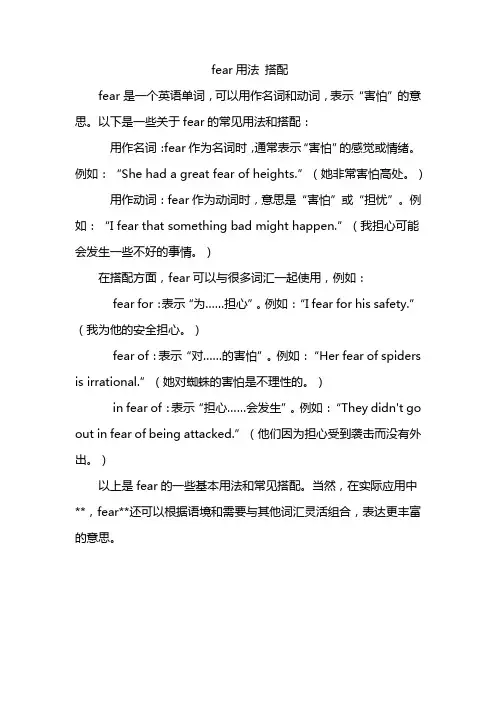
fear用法搭配
fear 是一个英语单词,可以用作名词和动词,表示“害怕”的意思。
以下是一些关于fear的常见用法和搭配:
用作名词:fear作为名词时,通常表示“害怕”的感觉或情绪。
例如:“She had a great fear of heights.”(她非常害怕高处。
)用作动词:fear作为动词时,意思是“害怕”或“担忧”。
例如:“I fear that something bad might happen.”(我担心可能会发生一些不好的事情。
)
在搭配方面,fear可以与很多词汇一起使用,例如:
fear for:表示“为……担心”。
例如:“I fear for his safety.”(我为他的安全担心。
)
fear of:表示“对……的害怕”。
例如:“Her fear of spiders is irrational.”(她对蜘蛛的害怕是不理性的。
)
in fear of:表示“担心……会发生”。
例如:“They didn't go out in fear of being attacked.”(他们因为担心受到袭击而没有外出。
)
以上是fear的一些基本用法和常见搭配。
当然,在实际应用中**,fear**还可以根据语境和需要与其他词汇灵活组合,表达更丰富的意思。
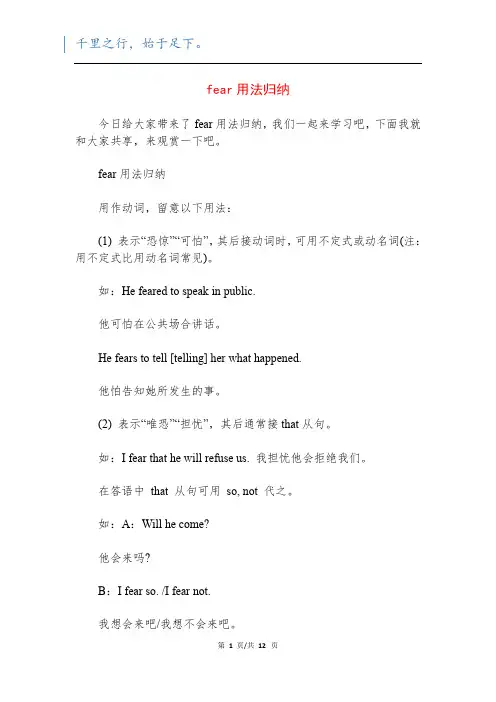
fear用法归纳今日给大家带来了fear用法归纳,我们一起来学习吧,下面我就和大家共享,来观赏一下吧。
fear用法归纳用作动词,留意以下用法:(1) 表示“恐惊”“可怕”,其后接动词时,可用不定式或动名词(注:用不定式比用动名词常见)。
如:He feared to speak in public.他可怕在公共场合讲话。
He fears to tell [telling] her what happened.他怕告知她所发生的事。
(2) 表示“唯恐”“担忧”,其后通常接that从句。
如:I fear that he will refuse us. 我担忧他会拒绝我们。
在答语中that 从句可用so, not 代之。
如:A:Will he come?他会来吗?B:I fear so. /I fear not.我想会来吧/我想不会来吧。
【注】后接否定的宾语从句时,通常不转移到主句。
如:I fear it won’t do much good.我担忧这不会有多大好处。
(3) 通常不接不定式的复合结构。
如:我担忧他会失败。
误:I fear him to fail.正:I fear that he will fail.(4) 比较fearsb与fearforsb:前者意为可怕某人,后者意为为某人担忧。
如:He fears his wife.他怕他老婆。
He fears for his wife.他为他老婆担忧。
2用作名词,比较forfearof与infearof:前者意为“由于怕……”“以防……”,后者意为“可怕”“担忧”。
如:Shut the window for fear of catching a cold. 关闭窗户以免感冒。
We’re in fear of more snow.我们担忧会再下雪。
The thief passed the day in fear of discovery. 这个小偷成天提心掉胆担忧会被发觉。
高考英语写作读后续写语料库(1)情感描写1.喜乐1. The smile on her face shone like a diamond .她脸上的笑容像钻石一样闪闪发光。
2. A smile of understanding flashed across his face. 他脸上露出了一种理解的微笑。
3. A ripple of excitement ran through them. 一阵激动声穿过他们。
ughter lingered around the room. 笑声在房间里萦绕。
(liner v. 逗留,徘徊)5. His eyes twinkled with pleasure .他的眼睛闪烁着快乐。
6. A wild gaiety (快乐)took hold of her. 一种疯狂的快乐控制了她。
7. Unforgettable were her eyes that shone like diamonds and lips held in a steady smile.令人难忘的是她的眼睛像钻石一样闪闪发光,嘴角保持着稳定的微笑。
* 句式也很美 *8. I was wild with joy .我欣喜若狂。
9. I was pleased beyond description .我高兴得难以形容。
10. She wore a shining smile on her face. 她脸上带着灿烂的笑容。
11.Her smile lit up the whole room. 她的笑容照亮了整个房间。
12. She shed tears of joy .她高兴得流下了眼泪。
(shed v. 流下;流出)13. Her eyes were sparkling like diamonds .她的眼睛闪着钻石般的光芒。
14. She was overflowing with happiness .她洋溢着幸福。
fear词根1. 单词概述单词:fear含义:“fear”作名词时,表示害怕、恐惧的情绪,比如当我们看到恐怖电影里突然出现的吓人场景时,就会有fear的感觉。
作动词时,意为害怕、畏惧,像有些人fear蜘蛛,看到就会远远躲开。
2. 词根词缀解析词根:“fear”本身可看作词根,来源于古英语,它表示“害怕,恐惧”的意思。
3. 应用短文与场景应用短文1:I'll tell you a story about my friend Tom and his encounter with fear. Tom was always a brave guy, or at least that's what we all thought. One day, we decided to go camping in the mountains. As night fell, we were sitting around the campfire, sharing stories and having a great time. But then, we heard some strange noisesing from the woods. It was like a low growl, and it sent shivers down our spines. Tom, who was usually so fearless, suddenly went pale. "What on earth could that be?" he whispered, his voice quivering a bit. I could see the fear in his eyes. I tried to be calm and said, "Maybe it's just a wild animal passing by. No big deal." But Tom wasn't convinced. He said, "I don't know, man. It sounds really creepy. I'm starting to fear that it might be something dangerous." We all sat there in silence for a while, listening intently to the noises. Then, all of a sudden, a little rabbit hopped out of the bushes. We all burst out laughing. Tom let out a sigh of relief and said, "Oh my god, I can't believe I was so scared. I let my fear get the better of me this time."中文翻译:我要给你们讲一个我朋友汤姆和他遭遇恐惧的故事。
fear n. & v. 害怕,畏惧;担心[特征]- the boy was shaking with fear.男孩害怕得直发抖。
- there is no fear of his losing his way.他不会迷路的。
- i fear that you'll be late if you don't go now.如果你现在不走的话,我担心你会迟到。
[贴心叮咛]fear是一个非常重要的单词,要注意它的用法。
[考点]①for fear + that从句,从句中必须有情态动词。
- she shut the window for fear that it might rain.她把窗户关上,怕下雨。
②fear作名词时,表示“对……担心”,要用介词of。
- there is not much fear of that.那件事不大可能发生。
③fear作动词,后面可接动名词或不定式,意义相同,fear doing sth. = fear to do sth. 害怕坐某事。
[备考必背]①重要词组:in fear of 生怕,为……提心吊胆- he is in fear of his life.他为他的生命担心。
②派生词:fearful adj. 可怕的,吓人的fearless adj. 不怕的,无畏的[练习与解答]- he got to the station early, missing the train. [2004 江苏]a. in case ofb. instead ofc. for fear ofd. in search of答案:c(因害怕误了火车,他早早就到了车站。
in case of的意思是“万一,一旦出现……情况”。
instead of的意思是“代替,而不”;in search of的意思是“寻找,搜寻”。
这三个选项都不符合题意。
for fear of则是“担心,害怕”的意思。
229基于COCA 语料库的“恐惧类”同义词汇辨析——以“fright”“fear”“dread”“dismay”为例[作者简介]陶然,沈阳化工大学,硕士,研究方向:语言与文化。
基于COCA 语料库的“恐惧类”同义词汇辨析——以“fright”“fear”“dread”“dismay”为例陶 然(沈阳化工大学 辽宁 沈阳 110000)摘要:国内基础英语教育非常重视学习者对于同义词的理解运用。
基础教学中同义词的辨析占了很大的教学比重。
语料库的研究使得学习者可以更直观地区分同义词中的细微差别。
基于COCA 语料库对关于“恐惧类”词汇的常规用法进行梳理统计,为基础英语同义词教学提供新的思路。
关键词:语料库 同义词辨析 语域 语义韵中图分类号:H313 文献标识码:A 文章编号:1009—5349(2019)17—0229—02目前,国内的基础英语教学中很重视英文同义词的区分。
国内最能代表基础英语教育水平的考试是中高考。
中考和高考共同具有的典型题型有单选、选词填空、完形填空和阅读等。
以二线城市初、高中各一名普通学生一年所做的试题为研究对象,可以知道同义词辨析题占单选题中的25%,选词填空的20%,完形填空的45%,阅读的10%。
由此可知,与同义词相关的知识点,在初、高中的考试中出现的频率较高。
我们选取了一些初、高中的学生作为访谈对象进行了采访。
访谈中发现,在同义词辨析教学中,更多采取的方法是通过中文区分词义,然后诵读例句,记常规用法,帮助学习者灵活运用。
然而,由于中英文存在差异,有些英文同义词很难通过中文词义进行区分。
背诵例句培养的“语感”也很难保证正确率。
语料库的出现,为学习英文同义词提供了新的选择。
在COCA 语料库中,所有的词的用法都是来自母语使用者,真实地反映了母语使用者对同义词的词义区分。
此外,其涵盖范围广泛,包括口语、小说、报纸、学术,数据全面可靠。
本文将基于COCA 语料库对一组表示“恐惧类”的词汇进行辨析研究。
fear的用法总结大全(学习版)编制人:__________________审核人:__________________审批人:__________________编制学校:__________________编制时间:____年____月____日序言下载提示:该文档是本店铺精心编制而成的,希望大家下载后,能够帮助大家解决实际问题。
文档下载后可定制修改,请根据实际需要进行调整和使用,谢谢!并且,本店铺为大家提供各种类型的经典范文,如英语单词、英语语法、英语听力、英语知识点、语文知识点、文言文、数学公式、数学知识点、作文大全、其他资料等等,想了解不同范文格式和写法,敬请关注!Download tips: This document is carefully compiled by this editor.I hope that after you download it, it can help you solve practical problems. The document can be customized and modified after downloading, please adjust and use it according to actual needs, thank you!In addition, this shop provides various types of classic sample essays, such as English words, English grammar, English listening, English knowledge points, Chinese knowledge points, classical Chinese, mathematical formulas, mathematics knowledge points, composition books, other materials, etc. Learn about the different formats and writing styles of sample essays, so stay tuned!fear的用法总结大全fear的意思n. 害怕;可能性;(对神等的)敬畏;忧虑vt. 畏惧;害怕;为…忧虑(或担心、焦虑);敬畏(神等)vi. 害怕;忧虑;感到害怕;惧怕fear的用法用作名词Love, hate, joy, fear and grief are emotions.爱、恨、高兴、恐惧、悲伤都是情感。
afraid用法详解总结今天给大家带来了afraid用法详解,快来一起学习吧,下面就和大家分享,来欣赏一下吧。
afraid用法详解【基本用法】1.害怕的,恐惧的:Dont be afraid. 别怕。
She is afraid of dogs. 她怕狗。
She is afraid of snakes. 她怕蛇。
He was afraid of nothing. 他什么也不怕。
She was afraid of waking him. 她担心把他吵醒。
She was afraid to see you again. 她怕再次见到你。
1 was afraid to tell you. 我不敢告诉你。
They were afraid to be seen by others. 他们怕被别人看到。
He is afraid he will die. 他害怕他会死。
I was afraid I might hurt your feelings. 我担心我会伤害你的感情。
She was afraid they would recognize her. 她担心他们会认出她来。
2.担心的:Im afraid that he wont come. 我担心他不会来。
"Is he not coming?" "I am afraid not.(I’m afraid so.)" “他不来吗?”“看来不会(怕是这样)。
”I’m afraid l can’t stay. 恐怕我不能待了。
I’m afraid you don’t see my point. 恐怕你没听懂我的意思。
“Are we late?” “I’m afraid so. ” “我们迟到了吗?”“怕是迟到了。
”I’m afraid I must ask you to leave the country. 对不起我得让你离开这个国家。
Term paper for Corpus Linguistics and EFL Teaching
Name: 刘鑫意Class 英师4班Student No. 20150207034
1.Item investigated
Fear( as a noun)
2.Data
CHILD (Z:\EC\CHILD)
21st College English (Z: \EFL\BOOK\H\U)
3.Corpus tools used
AntConc (concordance, collocates, clusters)
4.Findings
4.1.Colligation patterns
(1)for fear (that) +adverbial clause (20 out of 200 examples, 10%)
e.g. But I never dared to ask anyone for fear she would tell me it wasn't.
She'll never miss her first chance for fear she might not get another.
Though not a human creature is allowed to go near for fear they'll look at him.
(2)for fear of doing sth. (15 out of 200 examples, 7.5%)
e.g. I am always afraid to say things to you for fear of making you angry.
But she did not say this aloud, for fear of hurting the poor Queen's feeling .
Alice got behind a tree, for fear of being run over, and watched them go by.
(3)feel/have (no) fear for/of sth. (8 out of 200 examples, 4%)
e.g. I have no fear for the man-cub.
They, because they live in trees, have no fear of any of our people.
But the Tin Woodman, having no fear of fire, averted the stampede by a few
sensible words.
(4) fear+ that +Noun Clauses (8 out of 200 examples, 4%)
e.g. The fear that something may happen rests like a shadow on my heart.
He said, "that is the fear that haunts me."
The princess, greatly surprised, could not resist the fear that seized her.
4.2.Semantic preference and collocates
Fear means emotion caused by the nearness or possibility of danger, pain, evil. It is often decorated by negative adjectives:
e.g. Sometimes a dreadful fear comes over me that I'm not a genius.
Marilla sharply, relieve from her horrible fear of the well.
He shut his eyes in mortal fear, and made a leap at random.
It often appears with negative nouns:
e.g. The hermit bowed his head again, but this time with great sorrow and fear.
In all the trouble and sickness and fear of that time, Margaret drove her cart of bread.
He also senses the rejection, indifference, fear, or hostility.
It is often used with negative verbs or verb phrases:
e.g. She had risen, and now at last a fear assailed him.
But pleasure soon dispelled her fear, and she continued to view the pleasing figure.
A sickening fear shot through her heart.
4.3.Set phrases
(1)with fear
(2)in fear
5.Implications for teaching
Fear means emotion caused by the nearness or possibility of danger, pain, evil. It’s particularly useful in writing since it can be used quite flexibly. However, it does not seem to appear often in textbooks. Its various patterns are not often used by Chinese students, either. When students need to use this word, they tend to use the word separately. Thus guidance and instruction is probably necessary for them to master various patterns including the word, the meaning as well as the use of them.
When teaching, teachers can introduce various patterns and semantic preference to students to help them express the feeling accurately. Meanwhile, teachers can make use of examples from native English corpora, especially stories writing corpora, as important complementary materials to the textbooks.
Word count: 550
References
Oxford Advanced Learner's English-Chinese Dictionary。